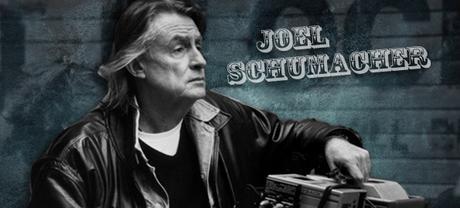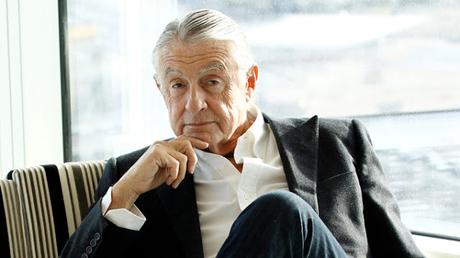
Director Joel Schumacher succumbed to cancer this morning at age 80. This is the first of three chats I had with him, here for the thriller 8mm in 1999. A master raconteur, Schumacher was charming, flirtatious, and worldly. I had to remind him eventually that flirting with me would only result in disappointment for him, which he handled with aplomb and, to his credit, he never did so again. Many actors and filmmakers are very engaging during interviews, but if you run into them again out in the world, they can either "DK (don't know) you," or give you a full-on Heisman brush off. Schumacher never did this and I bumped into him many times over the years. He had tried at one point to help get a script of mine produced, and we actually came quite close, but in the end, as it often happens in Hollywood, it was close but no cigar. He always encouraged me to keep writing, saying "You and I both know how good you are, and you know there's no reason I'd blow smoke up your ass, especially since we both know it's not going to get me anywhere," a sentence he finished with a wink. An underrated filmmaker to the very end, Schumacher leaves behind a legacy of some powerful works that will surely endure, which are sadly overshadowed by a handful of overblown turkeys he certainly did for the paycheck, as opposed to the love of the art. Joel Schumacher was an artist, whose films show a painterly eye in their composition and attention to detail. I'll miss his presence behind the camera, and I will miss Joel himself. He was a nice man. Rest in peace, maestro.
Editor's Note: This article orgially appeared in the February 1999 issue of Venice Magazine.
JOEL SCHUMACHER:
SAFE IN THE DARK
By
Alex Simon
It's fall of 1987, and I've just moved to L.A. to begin film school at USC. After going through the requisite culture shock expected for a nice Jewish kid from Tempe, Arizona, I set about the first important task of every nice Jewish boy at USC: find a classic Southern California blonde, shiksa goddess to call my own, and make all the cowpokes back home green with envy as they look at snapshots of moi, and said goddess, frolicking on the beach, at the football game, at the big frat party, etc. So I move into my residence hall. So far so good. First day in the lobby-BOOM! There she is, as if sent down by the goddess Venus herself (and created in her image, no less), a blonde beauty of Amazonian proportions: golden locks, tan shapely legs, eyes the color of the South Pacific. She even hailed from San Marino and drove a white convertible Rabbit. She was every 1980's-era Arizona transplant's wet dream come true. I locked my sensors on-target and moved in for the kill with the stealthy skill of the most cunning jungle cat. Her name was (we'll just call her Christy), and that Friday night, she was all mine! I did some asking around, and was informed that the traditional USC first date was sushi and a movie in Westwood, home turf of our mortal enemies, the Bruins. We had sushi at (rest in peace) Light & Healthy. Being a hick from Arizona, I thought the wasabe sauce was guacamole and stuffed the entire ball in my mouth. After the paramedics revived me, it was time for the movie portion of the date. We walked around the village until we came to the two most imposing and impressive theaters: the Fox and the Bruin. The Fox was showing Coming to America, which I'd already seen. The Bruin was showing something called The Lost Boys. It was opening night, and all I knew about it was that it was about teen vampires and the lead actor bared an uncanny resemblance to the Lizard King himself, James Douglas Morrison. "Gee," I thought. "Horror movie=scared girl. Scared girl=girl who's going to cling on me for protection. Girl who clings on me =..." you get the idea. Two tickets were purchased. Two seats were taken. The lights went down. And...oh daddy, what a ride! I'd never seen anything like it. It was a horror movie, alright, but also a hell of a comedy. It was a hell of a comedy, but also a terrific romance. It was a terrific romance, but also a very perceptive portrait of alienated teens. Did I happen to mention it also scared the living hell out of me? Christy was scared, too. We had a great time that night, but I knew the relationship was doomed when I remarked how much lead hunk Jason Patric looked like Jim Morrison of The Doors. Christy: "Who's Jim Morrison? What're The Doors?" Seemed Christy's pop cultural consciousness started somewhere around the time of Olivia Newton-John and John Travolta. She had never even seen a foreign film. (If I remember right, her favorite movie was Legal Eagles (1986) because "It was the last movie I saw, so it's the one I remember the best.") Sad to say, Christy and I failed to become an item after that night. She became a USC cheerleader and went on to marry a dork banker who also came from San Marino. I think his name was "Chip." Anyway, the one good thing that came out of that evening was that I discovered a new director whose work I knew I must begin to follow. The name Joel Schumacher wasn't yet a household one, but The Lost Boys and many of his movies to come, were about to be.
Joel Schumacher was born in 1939 in New York City. After the death of his father, Schumacher became a self-described street kid, spending much of his free time at the movie theater directly behind his apartment building on Long Island. It was here that the idols of the silver screen became his baby-sitters, teachers and best friends. Schumacher knew he had found his calling. While attending Otis Parson's School of Design, he began his working career as a display artist for the fashionable Henri Bendel department store. He later opened his own boutique, then joined Revlon as a designer of clothing and packaging.
He broke into films in the early 70's as a costume designer for such films as Woody Allen's Sleeper (1973) and Interiors (1978), and Paul Mazursky's Blume In Love (1973). He then turned to screenwriting, with Sparkle and the hit Car Wash (both 1976), and the musical smash The Wiz (1978). He made his directorial debut in TV, with The Virginia Hill Story (1974), starring Harvey Keitel and Dyan Cannon as mobster Bugsy Siegel and his paramour, later portrayed by Warren Beatty and Annette Benning in Bugsy (1991). Schumacher followed this with Amateur Night at the Dixie Bar and Grill (1979), which he also wrote, and many TV critics considered to be one of the best MOW's of the 70's. That praise gave Schumacher enough juice to break into features with The Incredible Shrinking Woman (1981) starring Lily Tomlin, followed by another comedy D.C. Cab (1983), then hit paydirt with St. Elmo's Fire in 1985. Known initially as the film that introduced the world to "The Brat Pack" of hot young actors (Emilio Estevez, Judd Nelson, Ally Sheedy, Andrew McCarthy, Mare Winningham, and Rob Lowe), the film is now considered by many to be a touchstone of the 1980's in its portrayal of the vapid pursuits of post-collegiate yuppies in Georgetown. St. Elmo's was followed by The Lost Boys in 1987, and then Cousins (1989), a delightful remake of the French comedy Cousin-Cousine (1975). Schumacher made his first venture into dark territory with Flatliners (1990), an eerie supernatural thriller about medical students playing God with life after death experiments. Schumacher continued exploring somber themes with Dying Young (1991), starring Julia Roberts as a nurse/companion to terminally ill Campbell Scott, followed by Falling Down in 1993, with Michael Douglas as an everyman who has a nervous breakdown, going on an increasingly violent rampage through the streets of L.A. Schumacher has directed two big screen adaptations of best-selling author John Grisham The Client in 1994 and A Time to Kill in 1996, as well as two films in the popular Batman franchise: Batman Forever in 1995 and Batman & Robin in 1997. In addition to his film work, Schumacher has directed for the stage, most notably a Chicago production of David Mamet's Speed the Plow in 1988.
Schumacher's latest film is without a doubt, his finest. 8mm stars Nicholas Cage as a private investigator whose elderly client, the widow of a recently-deceased business tycoon, discovers what appears to be a "snuff" film (pornography that supposedly displays an actual murder) in her late husband's safe. She wants Cage to find out if it is, in fact, real or a fake, leading Cage on a nightmarish journey through society's lower depths that Joseph Campbell could have appreciated. 8mm is quite simply the toughest, most relentless, and most intense American thriller since 1991's Silence of the Lambs. Kudos to Schumacher, writer Andrew Kevin Walker (Seven), star Cage, and the studio for releasing the film with all its darkness intact. 8mm co-stars Joaquin Phoenix, Catherine Keener and James Gandolfini. The Sony/Tri-Star release opened wide in L.A. February 26.
Joel Schumacher eases his lanky, 6 foot-plus frame into a chair after a long day of interviews, laughing as he recalls to his present company, some of the more absurd questions which have been posed to him during the three day press junket. "Why make a dark film?" "Do scary movies give you nightmares?" Schumacher laughs at the memories. Here's a few more...
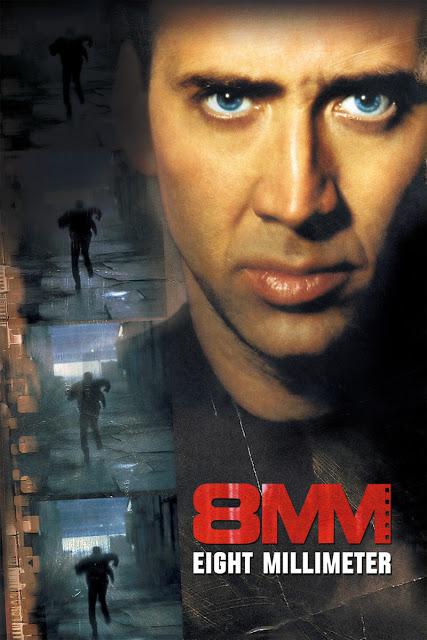
The movie was incredible. I really respect the fact that you kept the tone so dark, and didn't shy away from going all the way into the abyss and back.
Joel Schumacher: By the time it was offered to me, Columbia had already bought it, and it was a young woman President (of the studio), Amy Pascal who bought it. When I said I was going to do this, and then Nic said he was going to do it, suddenly everyone in town was saying "I was going to buy that script!" (laughs) But Amy really stepped up to the plate. I had never read anything like it, ever. I knew this movie hadn't been made yet. I knew it could be made for a price, and wouldn't have to be a blockbuster to be a successful film. It was challenging, and fascinating and disturbing. I also thought all the parts were so interesting, that we would attract interesting actors, which we did. Great actors in every role. I think Andrew Kevin Walker has a unique point of view. He dares to go where many will not go...The biggest challenge was my fear of glamorizing any of it. I really wanted to show how sordid the whole world (of pornography) is.
Plus a lot of your films are known for having a very distinctive, slick, glamorous look.
Content always dictates the form.
Did you have trouble getting an 'R' rating initially?
We got an 'NC-17,' which I expected, because we had to take you there to take you there. We worked with the ratings board and they were wonderful to us, very fair. We worked sometimes frame-by-frame, to make sure they were comfortable changing it to an 'R.' But if I hadn't taken you there, and then cut back, we wouldn't have gone there. It would have been too conservative.
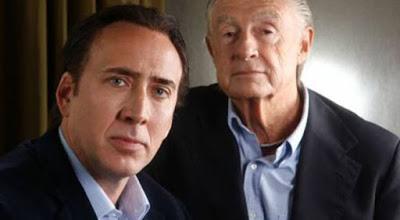
So how many minutes of restored footage are we going to see on the "Special Unrated Director's Cut" which will be on DVD and video next year?
(laughs) Not as much as you think. Strangely enough, they were more concerned about the violence. A lot of what makes porn illegal is the mixture of sex and violence. There is mainstream porno in every video store, cable system and hotel room in the world. And on the internet. Then there are violent films, which we make all the time in Hollywood, but there are S & M films which can still be sold over the counter. The minute you mix violence and sex in film, it makes it illegal. And I think for obvious reasons, it may tantalize and exacerbate the already-disturbed. Then there's the lowest form, which is kiddie porn, bestiality, it goes on and on, and is going on at this very minute. And it's not just that little guy in the raincoat buying it, it's a lot of people. $10 billion last year was made in the porn business in this country, almost a billion from just phone sex.
And I'll bet 90% of that came from the Starr Commission in Washington.
(laughs) There seems to be hypocrisy, doesn't there? How about Jerry Falwell outing one of the Teletubbies?! Don't you have to have genitals to be sexual at all? (laughs) He's a sick man, no question.
I thought the way you showed the snuff film was very well done. We saw just enough to know what was going on.
What you can imagine is always more disturbing that what you can see. We ran into the same thing with the opening of A Time to Kill, in which a little girl is beaten and raped. So of course, it cannot be shown, nor would we show it if we could. It's the dark that scares us, not what we see once the light comes on.
The other thing I really respected was the fact that you didn't shy away from the revenge aspect of the script. You had the protagonist go all the way, not walk away and say "You're not worth it," or some other cop-out.
That's one of the things I thought was so powerful about Andrew's script. I think we've all had that fantasy about confronting the Oklahoma City bomber, or any number of these horrible criminals...then also after he's satisfied his revenge, we see that he's deeply affected by it, and always will be. In so many films, we see the hero or heroine kill the bad guy, then walk away and make a joke. Nic and I talked a lot about a young man who goes to war, who had led a fairly normal life, then witnesses atrocities and madness, the likes of which he'd never imagined, and even participated in some of it. Like the characters in The Deer Hunter (1978). Then they come back, pick up their normal lives as fathers, workers, husbands, but never forget what they saw. Many war veterans never discuss what they saw, and many Holocaust survivors never told their children. I think that was very powerful in the piece also, that this is a man who will never forget.
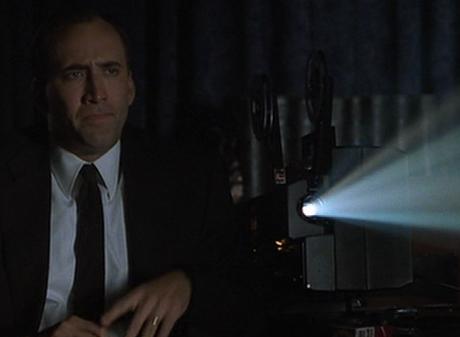
This film reminded me a bit of a Sidney Lumet film called The Offence (1973), starring Sean Connery about a cop who interrogates a child molester and then kills him.
Yes! That was a great film, and nobody saw it! During the shoot, Nic used a Nietzsche quote as his mantra: "Whoever fights monsters should see to it that in the process he does not become a monster." One of the things that propelled me was friends of mine had a child that kept obsessing on the question "Why do bad things happen to good people?" They didn't have the answer, so they went to their priest. The priest said "That's the wrong question. The question is 'Bad things happen to good people. What are you going to do about it?'" And I thought that was really powerful. I think that one of the mirrors that 8mm strikes is that we all know deep inside that this is all out there somewhere. And we don't want to know too much about it because what will we do if we know?
In the course of Andrew's research or your research, did you find proof that snuff films actually exist?
I don't know about Andrew's research. He worked in a video store for part of his youth, and he says he's never seen one. I've never seen one, don't want to ever see one, and hope they don't exist. There is a book that James Gandolfini gave me just before shooting began called Gods of Death. It was written by an Israeli named Yaron Svoray, who exposed that neo-Nazi ring in Berlin. In Gods of Death, he decided to go out and see if there was actually such a thing as snuff, and in it, claims to have seen things that are much worse than you could ever dream. He claims that there's a group of people who get young soldiers in Bosnia, or wherever there's wars and atrocities, to take a camera and film when they're raping and killing people. There's a market for that. But you see, even fake snuff, you have to question by saying 'Who's watching fake snuff?' If you're watching fake torture and bondage, how is that different from watching real torture and bondage?...In mainstream movies, though, we usually get to see the hero or heroine catch up with the boogie man and vanquish him. Movies, books, plays, all have endings, usually a just ending for that story. In life, there are no endings, really, and no just endings most of the time. It's usually complex and ambivalent and strange, and nothing gets solved anyway.
It's a Robert Altman ending as opposed to a Preston Sturges ending.
(laughs) Right, or a Frank Capra ending.
Some of the scenes in 8mm must have taken an incredible toll emotionally, for you and the actors.
Yes, because as the director, you have to go there with them. It's a very strange schizophrenia, because there were certain times when I said to myself "God, they're just in misery," then there's another part of you going "Yes! We just got this great honesty." The phone call Nic makes to Amy Morton towards the end of the film, that scene left both of them emotional wrecks. When Amy did hers in this tiny bedroom downtown after the first or second take, she was on the floor, hysterical and I picked her up and hugged her, and kissed her. She started to kind of laugh through it and said "Just tell me I never have to do that again." (laughs) Like all great artists, she had to be there. It had to be real for her. Then, when Nic makes the call to Mrs. Christian, who's played by Myra Carter, in a much different way, a very quiet way...expresses what she feared all along was true.
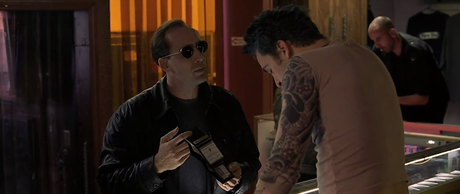
That's another question this film raises: how well do we really know the people we love?
Well, that $10 billion dollars that's being spent on the sex industry, somebody you know is spending some of that...Some of the seemingly least-likely people are into some very dark stuff. I mean, when they find the guy with the 30 dead bodies behind the house, it's always the Scoutmaster, or the clown, never an evil-looking guy with a handlebar mustache.
The most pious people always have the most to hide.
Absolutely! Look at Jerry Falwell! It's outrageous.
The film really disturbed me. Really stayed with me. It's your best work, thus far.
Thank you, that means a lot to me. So many of my friends have told me that, as well. Nic told me that. I'm a very lucky man. Very lucky. I've had a lot of insanity in my life that I've survived, thank you. I wanted to be a director ever since I was seven. I got this dream and I dreamed it as big as I could. I'm 59. I don't know how many more films God has planned for me. I really have to repay this opportunity by trying to strive to be the best human being I can be, which is a really hard job (laughs), then by making the best films that I can make, because I've been blessed with these opportunities. I've also been blessed that audiences have really supported my films, sometimes when the critics haven't. That means a great deal to me. That was another reason I chose this film. I knew I would have to reach for it. All my films are ensemble pieces, except for this one, you know? This is the first one that's really about one man going on a journey...When you do smaller budget films, which is how I built my career initially, and take bigger risks, I think the audience gets rewarded. It also doesn't have to be a blockbuster to be successful. It's okay to have a small profit with a movie. We've kind of forgotten that, I think.
All the films which we now consider "great films," the ones on the AFI 100 list, almost all of those were films that no one wanted to make.
I'm firmly convinced that if Gone With the Wind (1939) were made today, they'd have shot an alternate ending with Rhett coming back to Scarlett, tested both, and I have a horrible feeling...you know which ending would win. It's become Prozac entertainment. Nic said to me at lunch the other day "We've made a 70's movie." And that was a great compliment.
Another 70's film this reminded me of is Paul Schrader's Hardcore (1979).
Hardcore is the only film I've ever seen that dared to go to this place, also. It's a very good film, a very different film from (8mm)...Paul is amazing. Aside from writing some of our great films, he's been very daring for decades. It's nice to see him get all this attention for Affliction. He's fearless, too. I'll be anxious to see what he does next.
Let's talk about your childhood.
I was born in Long Island City, New York. My dad was what they called a "soda jerk," worked in a pharmacy, was studying to be pharmacist at night. He died when I was four. My mother was from Sweden. She went to week six days a week, two nights a week to support us...I was an only child. First there was a string of older ladies and teenage baby-sitters, but by the time I was seven, I was really out on the streets, wild in the streets! (laughs) Left home too young. My mother died when I was young, too. I've really done everything wrong that a human being can possibly do, except murder someone, thank God. Fast lane, drugs, you know. I'm a survivor of the 60's who stayed way too long at the party. Then I got out (to L.A.) thanks to Dominick Dunne, got a job as a $200 a week costume designer on a film called Play it as it Lays (1972). Joan Dideon and John Gregory Dunne made life really bearable the first years I was out here, very kindly invited me to their home for dinners. I met amazing people like Mike Nichols, Jack Nicholson, Roman Polanski, Bob Evans, the Sylberts, Warren Beatty, a lot of wonderful writers. I lived in a $150 a month apartment, living hand to mouth, then would go to their house once a week for dinner! So they sort of got me through it. So here I was, dreaming of being a director and I got it, bigger than I ever dreamed it. And now I'm seven years sober to tell about it.
Congratulations.
It was seven years on December 7th. When I got off hard drugs in 1970, shooting up, etc., I thought as long as I didn't shoot drugs, no problem. What was a few vodkas, or a few dozen vodkas? And a few bottles of wine and some recreational drugs here and there...then when I was shooting a film I'd stop, so I thought I didn't have a problem. I had the classic syndrome. Fortunately, I was able to get honest with myself. Trying to be the best human being I can be is much harder than directing a movie, but directing a movie is a good test for that, because there's so many different personalities that I'm dealing with every second that I'm filming. It's a test of patience, humanity, courage...It's a constant tightrope test of my own character. It is an industry and a city where greed, hubris, narcissism reign supreme. It exists in me like it does everyone else. So every day, I ask myself "Am I making the choice that serves others, and not just me?" So I'm very lucky. Lucky to even be alive. I should've been dead 50 times before I was 18. 100 times by the time I was 25. I really thank God that I never hurt anybody while I was drunk and stoned, because I drove around the city when I was (under the influence). I see people in AA meetings who've harmed others drunk driving, sometimes their own children, their own family members. If you kill yourself, you deserve it. If you kill someone else...
Let's talk some more about that 7 year-old kid.
Scared to death. Terrified. Lonely...
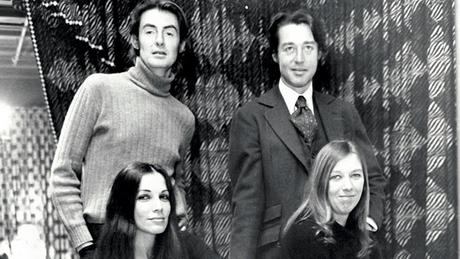 Salad days: Schumacher with designer Halston, Joanne Creveling and Frances Stein, circa 1968.
Salad days: Schumacher with designer Halston, Joanne Creveling and Frances Stein, circa 1968. Was the movie theater your church?
Uh-huh. The Sunnyside movie theater. It was right in back of our apartment house, underneath the elevated train. It was one of those big movie palaces they used to build in poor neighborhoods. I think I was a terrified child because my father was gone, and lived with the terror that my mother could die. And even though she was a wonderful woman and provided for us, she was never there. So I was really without her. And it was a tough neighborhood, but a good-hearted neighborhood in the long run. I was a wise-ass, but underneath it all, I was lonely, terrified, disconnected, but not in the movie theater! I'd sit in the dark, and those films reached out to me. When I travel and meet people that have seen my films, then talk to people about them, I hope I am part of this chain. I was this lonely person in the dark. Film reached out to me and I got lucky enough to make it. If my films reach out to anyone out there and make them laugh or cry, or get scared, or talk about something or affect them in some way, it's all part of a chain. Film is very powerful, and even the angriest curmudgeon you know has one film they love. Even when television came in, there was a lot of live drama. And much of it was very powerful, very dark. John Frankenheimer's version of Days of Wine and Roses (1958), Sidney Lumet's first version of 12 Angry Men, there was very high quality stuff on television, as well.
Tell us about some of the films you saw as a kid that affected you the most.
Great Expectations (1946) had a phenomenal effect on me when I was seven. I'm watching a lonely child wander through a graveyard, his father's dead three years, suddenly that convict jumps out from behind the headstone. What a moment! Shattering. It was also the story of a poor boy who has great expectations, being invited into the world of the rich and the decadent, which is where I knew I wanted to be, and got to as quickly as I could (laughs). Of course there were the great musicals, but I was always attracted to the more adult-oriented films, many of which I was too young to appreciate when I saw them. A Place in the Sun (1951), The Wild One (1954), Niagara (1953), Rebel Without a Cause (1955) of course, East of Eden (1954), A Streetcar Named Desire (1951), A Face in the Crowd (1957), The Goddess (1958)...lots of noir, Fritz Lang's The Big Heat (1951), The Postman Always Rings Twice (1946) one of the sexiest films ever made--and no sex (shown)! Gilda (1946) one of the greatest stripteases in film history, and all she takes off is a glove! Duel in the Sun (1946) a story of sexual repression and narcissistic mortification. Scarlet Street (1945) with Edward G. Robinson--what an actor! These were very dark movies, very tragic movies, usually the tragedies were self-created. Stories about self-destruction.
Did you ever see Nicholas Ray's In A Lonely Place (1950) starring Bogart?
Great film! Unbelievable film. Someone's trying to do a remake of it. I hope they don't.
What do you think about doing remakes?
If it's a remake of a bad movie, then do it, but if it was a great movie, why would you try to re-make it? How could you ever top a great film? You can't! I did a remake of a French film called Cousin-Cousine, but it wasn't a remake as much as an American version of the same story. In America, you can't treat adultery the same way they do in France...also my neighborhood when I was about 11 or 12, there was a little tiny theater called The Center where I discovered foreign films. I don't know how I fell into it, I'd probably just seen every American movie out at that time. I think I'd seen Picnic (1955) about 5,000 times by then. I once skipped school for two weeks just to see Kim Novak and William Holden do that dance! (laughs) So it was at the center where I saw films like Diabolique (1955), Open City (1945), The Nights of Cabiria (1957), all the Kurosawa films...I don't even know if I knew what I was watching, but I was mesmerized. Every movie I ever loved I think was condemned by the Catholic Church! (laughs)
Tell us about working with Woody Allen on Sleeper (1973).
It was great! We made it for $2 million. It was like the high school play. We were up in the Rocky Mountains, everyone pitching in. I cut that rubber nose out sitting on the steps of the National Center for Atmospheric Research, which was designed by I.M. Pei, and we just made everything up! We had no money! The robot costumes were mostly rented. I made the masks out of hockey masks. The cars were old Volkswagens with a fiberglass shell on top. Dale Hennessey was our production designer and did all of that. It was the greatest, so much fun. Diane Keaton was so brilliant, her timing so perfect. She was like Margaret Dumont with the Marx Brothers. It was a thrill to be working with Woody. I was a busboy in the Village in my teens, used to see Woody do his standup act there. We're still very close friends and he was the first and only director I ever worked with who encouraged me and believed that I would become a director. Coming from someone that brilliant, that was a very important moment in my life, in 1973. The dream seemed so far away, and for someone like that to say "You've got it, you're going to do it," it meant the world to me.
Let's talk about some of your other films. St. Elmo's Fire is now sort of a hallmark film for those who came of age in the 80's. With this, and many of your other films, it shows you have a real affinity for young people.
That comes from my Germanic immaturity. (laughs) I wrote that film with my assistant at the time, Carl Kurlander, who was in his early 20's. The whole idea of it came from when I was living in Georgetown during the shooting of D.C. Cab. Georgetown at that time was this entire planet of yuppies. There were all these kids who were in college, coming out of college, just going in college, and all the bars, restaurants, the stores, everything. It was the flip side of a retirement community where everyone's over 60. It seemed like you were visiting if you weren't their age. Unlike my era, in the 60's, when people were actually against the establishment and were doing everything possible not to be part of the status quo, it had changed so much, with so much pressure on these kids to have a 25 year plan, to be recruited right out of college, and they were, into jobs that were way beyond some of their maturity levels. With these expensive cars, expensive lofts, expensive clothes, they all had to be in debt. And they were living this sort of fantasy life. And I felt sad. I thought "Boy, getting out of college now is a very difficult challenge." Then I thought that nothing had been written about "the graduate" condition since The Graduate (1967), really. So I thought it would make a great idea for a movie and talked with Carl about it, who was very close to that experience, having just graduated from Duke himself. So we wrote this script on spec. A lot of studios didn't want it, because they were so appalled by the behavior of the young people in it, which lasted through the film's opening. We did not get one good review in the United States of America. That might sound like an exaggeration, but it's the truth. The critics, because most of them are older, were appalled by the behavior of the young people in the movie. I think that was partially due to the fact that all the youth movies up to that point portrayed guys as horny ass-grabbers and girls as the "nice girl," "the whore," or "the bitch." The youth films were all exploitational. Whereas with this, we shot it in Cinemascope. Steve Burum shot it. It was done in an 'A' way, the way you'd do a film with older actors. At the time, we had no idea this was going to connect with anyone. No one had heard of most of the cast. I had to get Ally Sheedy and Rob Lowe approved by the studio. It was all sort of thrown together in three weeks. It was all really lucky.
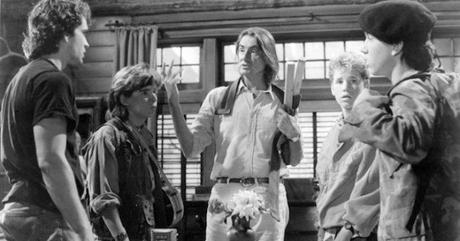 Schumacher directs his Lost Boys, 1986.
Schumacher directs his Lost Boys, 1986. Let's talk about The Lost Boys.
We really didn't know what we were doing then! (laughs) We made it up as we went along. The studio was incredibly patient and supportive considering they'd never heard of Keifer Sutherland, or Jason Patric, or Jamie Gertz, or Corey Haim...it was another big chance taken by a studio. We were very lucky. A lot of people at the studio didn't think you could mix horror and humor...Dick Donner was originally going to direct it, then wanted to do Lethal Weapon (1987) instead, so he gave it to me. What he wanted to do was quite different, which was sort of a cutesy, 'G'-rated movie aimed at young kids. There were no wild teenagers on motorcycles.
You've always been fascinated with dark subjects. Flatliners was an extremely dark film.
I think a lot of the credit goes to Peter Filardi. It was his first screenplay. I think the whole concept of performing death experiments was interesting, but when he brought to it that the participants would come back with unfinished business, that was fantastic. That's what grabbed me right away and I'm sure that's why I was able to get such a remarkable cast.
Does your being comfortable with dark material stem from your childhood experiences that you've discussed?
Yeah, but I think we all have a dark side. I think that a lot of our culture is set up for people to deny who they really are. I'm not saying that all people are inherently evil, but we spend so much of the time wanting people to think that we're perfect. That we don't have bad thoughts, or do bad things, that we're all really perfect people, and we are. We're perfect in our imperfections. This is what's most interesting to me: we talked about growing up on dark films, if you ask anyone what their favorite movies are, there's going to be dark ones in there. And what's interesting is that in 1999, as we go towards the year 2000, where we're supposed to be much more intelligent, more sophisticated, more in touch with what's going on in the world and we're constantly inundated with news and information...and I just spent the past two days doing interviews with people asking "Why do a dark movie?" It just reinforces that if Casablanca (1942) were made today, Ingrid Bergman would leave Paul Henreid and stay with Humphrey Bogart. (laughs)I don't understand this desperate need to have medication. Perhaps it's because times have gotten so complex, that people just want to go to the movies to be medicated. It'll be a sad day if that's all there is. If you want great drama, there must be some darkness in it.
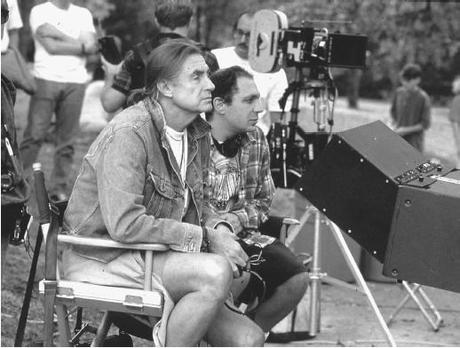
You started out as a screenwriter and have written some of the films you've directed. What are the challenges in doing both?
Well, I used screenwriting as a stepping stone for directing. But when you're directing something that you've written, you really have to fire the writer, because it's easy to get very precious about your dialog and what you've written. You have to be as critical and editorial about your own work as you would be about a stranger's, I think maybe even more so. I just directed a movie that I wrote called Flawless, starring Robert de Niro and Phillip Seymour Hoffman. It was a very joyous experience for me because it was the first time where I wrote something and didn't have an agenda. I wasn't praying that it would sell because I needed the development money, or to move me up one rung on the ladder, to get me a directing gig. I did it for sheer pleasure, for the joy of writing.
You've also directed for the stage. How is that different from directing film?
It's totally different. You are preparing the actors to direct themselves. Once the curtain goes up, it's all in their hands, because you cannot protect them the way you can on film. The theater is really the writers and actors medium. I would suggest every feature director should direct some theater, because it will give you such profound respect for actors.
Any advice for first-time directors?
I'll tell you exactly what Woody Allen told me: "Take a good look at this industry. There's a handful of geniuses that have been touched by the Gods. The rest of them, if they can do it, you can do it. And you can do it better. And if I can do it, you can do it, and you can do it better." Be bold, take risks, follow your own instincts, listen to other people only when you really believe in your gut that they're right. Get a great cast. Get a cinematographer that isn't jealous that you're the director. Get an editor that's not jealous you're the director. You can do it.
